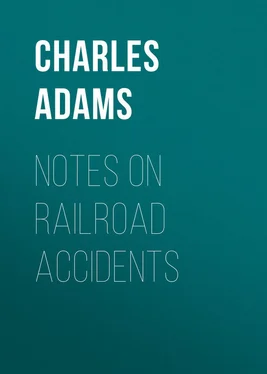Charles Adams - Notes on Railroad Accidents
Здесь есть возможность читать онлайн «Charles Adams - Notes on Railroad Accidents» — ознакомительный отрывок электронной книги совершенно бесплатно, а после прочтения отрывка купить полную версию. В некоторых случаях можно слушать аудио, скачать через торрент в формате fb2 и присутствует краткое содержание. Жанр: foreign_antique, foreign_prose, на английском языке. Описание произведения, (предисловие) а так же отзывы посетителей доступны на портале библиотеки ЛибКат.
- Название:Notes on Railroad Accidents
- Автор:
- Жанр:
- Год:неизвестен
- ISBN:нет данных
- Рейтинг книги:4 / 5. Голосов: 1
-
Избранное:Добавить в избранное
- Отзывы:
-
Ваша оценка:
- 80
- 1
- 2
- 3
- 4
- 5
Notes on Railroad Accidents: краткое содержание, описание и аннотация
Предлагаем к чтению аннотацию, описание, краткое содержание или предисловие (зависит от того, что написал сам автор книги «Notes on Railroad Accidents»). Если вы не нашли необходимую информацию о книге — напишите в комментариях, мы постараемся отыскать её.
Notes on Railroad Accidents — читать онлайн ознакомительный отрывок
Ниже представлен текст книги, разбитый по страницам. Система сохранения места последней прочитанной страницы, позволяет с удобством читать онлайн бесплатно книгу «Notes on Railroad Accidents», без необходимости каждый раз заново искать на чём Вы остановились. Поставьте закладку, и сможете в любой момент перейти на страницу, на которой закончили чтение.
Интервал:
Закладка:
Though wholly attributable to his own carelessness, the death of so prominent a character as Mr. Huskisson, on such an occasion, could not but make a deep impression on the public mind. The fact that the dying man was carried seventeen miles in twenty-five minutes in search of rest and medical aid, served rather to stimulate the vague apprehension which thereafter for a time associated itself with the new means of transportation, and converted it into a dangerous method of carriage which called for no inconsiderable display of nerve on the part of those using it. Indeed, as respects the safety of travel by rail there is an edifying similarity between the impressions which prevailed in England forty-five years ago and those which prevail in China now; for, when as recently as 1875 it was proposed to introduce railroads into the Celestial Empire, a vigorous native protest was fulminated against them, in which, among other things scarcely less astounding, it was alleged that "in all countries where railroads exist they are considered a very dangerous mode of locomotion, and, beyond those who have very urgent business to transact, no one thinks of using them."
On this subject, however, of the dangers incident to journeys by rail, a writer of nearly half a century back, who has left us one of the earliest descriptions of the Manchester & Liverpool road, thus reassured the public of those days, with a fresh quaintness of style which lends a present value to his words: "The occurrence of accidents is not so frequent as might be imagined, as the great weight of the carriages" (they weighed about one-tenth part as much as those now in use in America) "prevents them from easily starting off the rails; and so great is the momentum acquired by these heavy loads moving with such rapidity, that they easily pass over considerable obstacles. Even in those melancholy accidents where loss of life has been sustained, the bodies of the unfortunate sufferers, though run over by the wheels, have caused little irregularity in the motion, and the passengers in the carriages have not been sensible that any impediment has been encountered on the road."
Indeed, from the time of Mr. Huskisson's death, during a period of over eleven years, railroads enjoyed a remarkable and most fortunate exemption from accidents. During all that time there did not occur a single disaster resulting in any considerable loss of life; an immunity which seems to have been due to a variety of causes. Those early roads were, in the first place, remarkably well and thoroughly built, and were very cautiously operated under a light volume of traffic. The precautions then taken and the appliances in use would, it is true, strike the modern railroad superintendent as both primitive and comical; for instance, they involved the running of independent pilot locomotives in advance of all night passenger trains. Through all the years between 1830 and 1841, nevertheless, not a single really serious railroad disaster had to be recorded. This happy exemption was, however, quite as much due to good fortune as to anything else, as was well illustrated in the first accident at all serious in its character, which occurred, – an accident in its every circumstance, except loss of life, almost an exact parallel to the famous Revere disaster which happened nearly forty years later in Massachusetts. It chanced on the Manchester & Liverpool Railway on December 23, 1832. The second-class morning train had stopped at the Rainhill station to take in passengers, when those upon it heard through the dense fog another train, which had left Manchester forty-five minutes later, coming towards them at a high rate of speed. When it first became visible it was but one hundred and fifty yards off, and a collision was inevitable. Those in charge of the stationary train, however, succeeded in getting it under a slight headway, and in so much diminished the shock of the collision; but, notwithstanding, the last five carriages were injured, the one at the end being totally demolished. Though quite a number of the passengers were cut and bruised, and several were severely hurt, one only, strange to say, was killed.
Читать дальшеИнтервал:
Закладка:
Похожие книги на «Notes on Railroad Accidents»
Представляем Вашему вниманию похожие книги на «Notes on Railroad Accidents» списком для выбора. Мы отобрали схожую по названию и смыслу литературу в надежде предоставить читателям больше вариантов отыскать новые, интересные, ещё непрочитанные произведения.
Обсуждение, отзывы о книге «Notes on Railroad Accidents» и просто собственные мнения читателей. Оставьте ваши комментарии, напишите, что Вы думаете о произведении, его смысле или главных героях. Укажите что конкретно понравилось, а что нет, и почему Вы так считаете.












